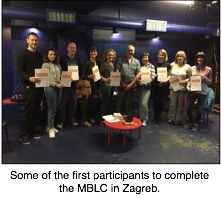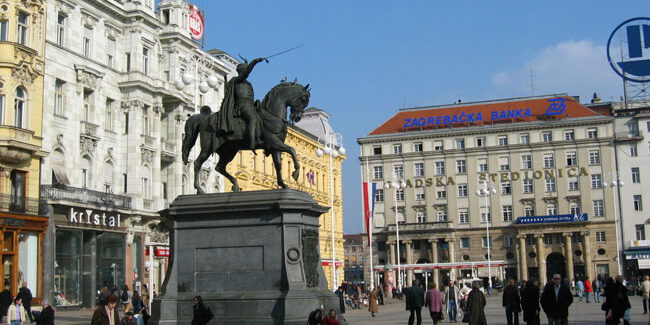Mindfulness, like all other human activities, occurs within a socio-historical cultural context. By this I mean that people’s attitudes towards mindfulness are informed by perspectives and traditions in their community, culture and society. The socio-historical cultural context for secular mindfulness in contemporary UK is, I believe, generally conducive. In the UK, contemplative and meditative practices have a long history in both religious and secular/humanist traditions, usually people are open to new ideas, and media comment and discussion about mindfulness is often serious – although not always!
In December 2015 I moved on from my academic post as Director of the MSc in Studies in Mindfulness at the University of Aberdeen and relocated to Croatia. I felt it was time for a new challenge in life. It was a big decision, but one that I have never regretted. Now, in addition to teaching and lecturing, I am co-creating and publishing books (http://www.inspiredbylearning.eu) and I have been fortunate to make friends with several people who are interested in mindfulness and who are actively developing it here in Croatia.
Which brings me back to my comments about socio-historical cultural context and to the main theme of this blog – what is it like to teach and develop secular mindfulness in Croatia?
As in the UK the context here is, generally, conducive towards mindfulness. There is interest in meditation, yoga is very popular, and there is a long established Buddhist Centre in Zagreb. Furthermore, there are long academic traditions of research in both neuro-science and in psychology, two of the sciences that inform secular mindfulness. (The first use of the term ‘psychology’ it is claimed, was by the 15th Century Croatian Marko Marulic).
So, there is interest in secular mindfulness, which is taking root here. Many people have completed Mindfulness Based Stress Reduction (MBSR) or equivalent courses abroad, or run by tutors visiting Croatia. Professionals who have completed this training are integrating mindfulness into psychotherapy, counselling, sports psychology and teacher education. However, mindfulness has not yet developed in Croatia to the extent that it has in the UK.
Language is an important contextual consideration, and it is not easy to find a word in Croatian (cro. hrvatski) that is an accurate translation of mindfulness. There are a few possibilities: razmišljanje, but this is more contemplation; zamisao, but this is better translated as thinking. The word that is increasingly being used here as an alternative to the English ‘mindfulness’ is punosvjesnost which means ‘fully aware’, which accurately conveys the intended meaning.
One of the developments that I have been very pleased to be involved in recently, is teaching the Mindfulness Association’s Mindfulness Based Living Course (MBLC) here in Zagreb – in the community, in a Faculty at the University with Masters students, and with staff at a psychiatric hospital. Participants are engaging with interest and enthusiasm, although sometimes they find it hard to prioritise time to practice daily. I am teaching in English, despite my twice weekly lessons in Croatian language – my fluency is just not quite there yet!! This is not a barrier to most people participating in the course as English is very commonly spoken and we do translate when necessary, although I have noticed that some participants are reluctant to share with others in English.
Participants have commented that they are pleased that somebody based in Zagreb is organising and leading an 8-week course on a regular cycle. As more people complete the MBLC, we are building a local community of people practicing secular mindfulness, drawn from a range of backgrounds. It is an exciting privilege to have the opportunity to be involved in this unique work. One participant wrote in an evaluation ‘Thank you for opening a new world to me’.
organising and leading an 8-week course on a regular cycle. As more people complete the MBLC, we are building a local community of people practicing secular mindfulness, drawn from a range of backgrounds. It is an exciting privilege to have the opportunity to be involved in this unique work. One participant wrote in an evaluation ‘Thank you for opening a new world to me’.
We have already organised an ‘away day’ and we have longer retreats planned. We hope that sometime in 2018 there will be enough interest to run the Mindfulness Association’s one year certificate course in Zagreb, with a lead tutor from the UK joining us to lead the course. There are also plans to establish a ‘Non-Governmental Organisation’ (NGO), ’Mindfulness Croatia’, so that a group of locally-based people will be making decisions about future mindfulness activities and developments. I think it will be a real achievement if the NGO can sponsor individuals to complete the Mindfulness Association’s Teacher Training Pathway, thereby increasing the number of MBLC teachers in Croatia. There is no rush however, and we are taking this ‘korak po korak’ – ‘step by step’.
If you are interested in keeping updated about mindfulness developments in Croatia, please ‘like’ and post to our Facebook page ‘Mindfulness Croatia : Punosvjesnost Hrvatska’. Or send me an email and I will add you to our mailing list (david@inspiredbylearning.eu).
Perhaps you will join us at a mindfulness retreat in beautiful Croatia or visit us in Zagreb..… you are most welcome!
-David McMurtry
1 Title: Trg bana Jelačića in Center of Zagreb. Author: Lamasse. Source: (Own work). Used under license: (CC BY 3.0) (https://creativecommons.org/licenses/by/3.0/deed.en)
To visit our website: please click here
To learn more about the MBLC: please click here


